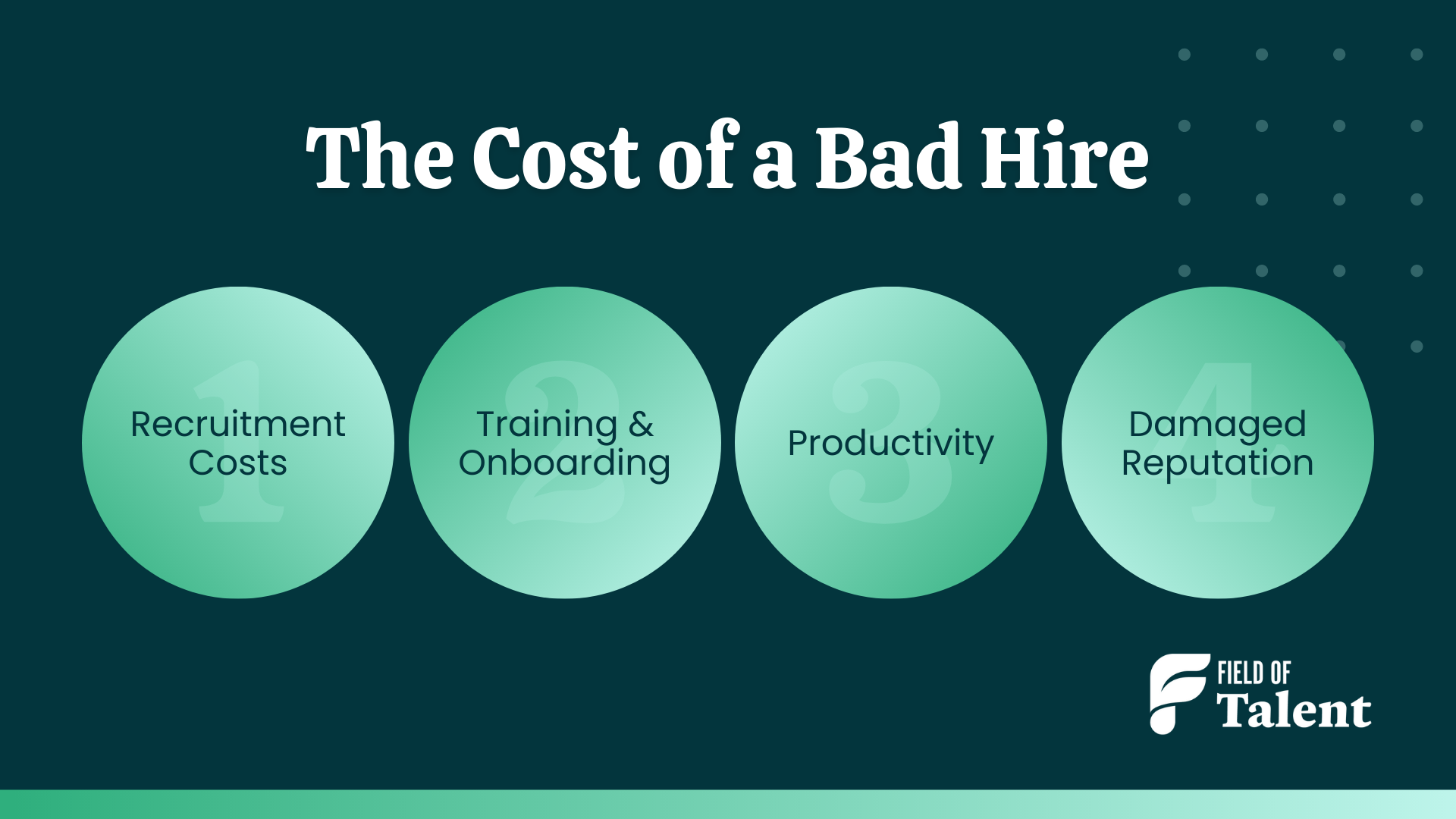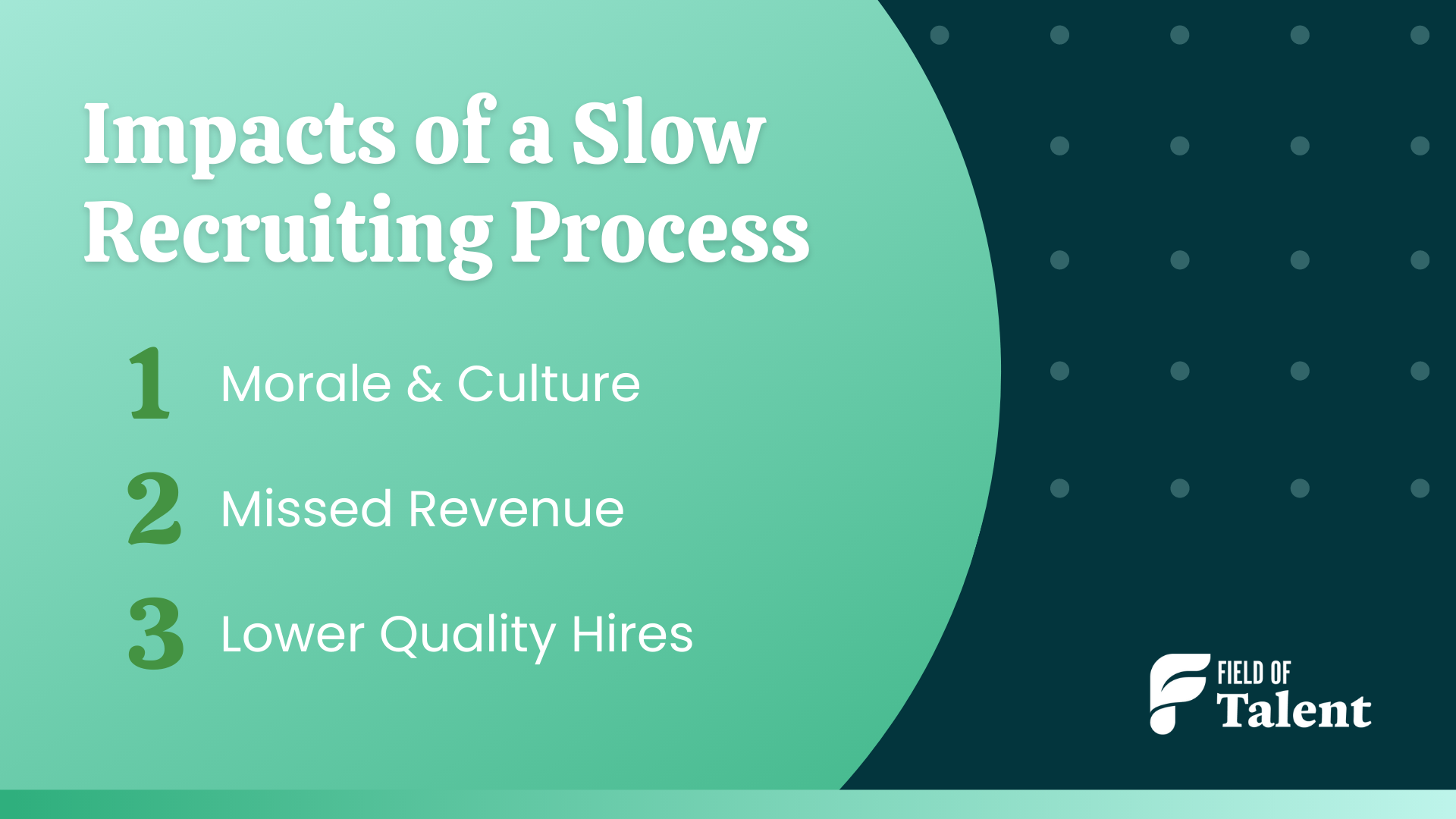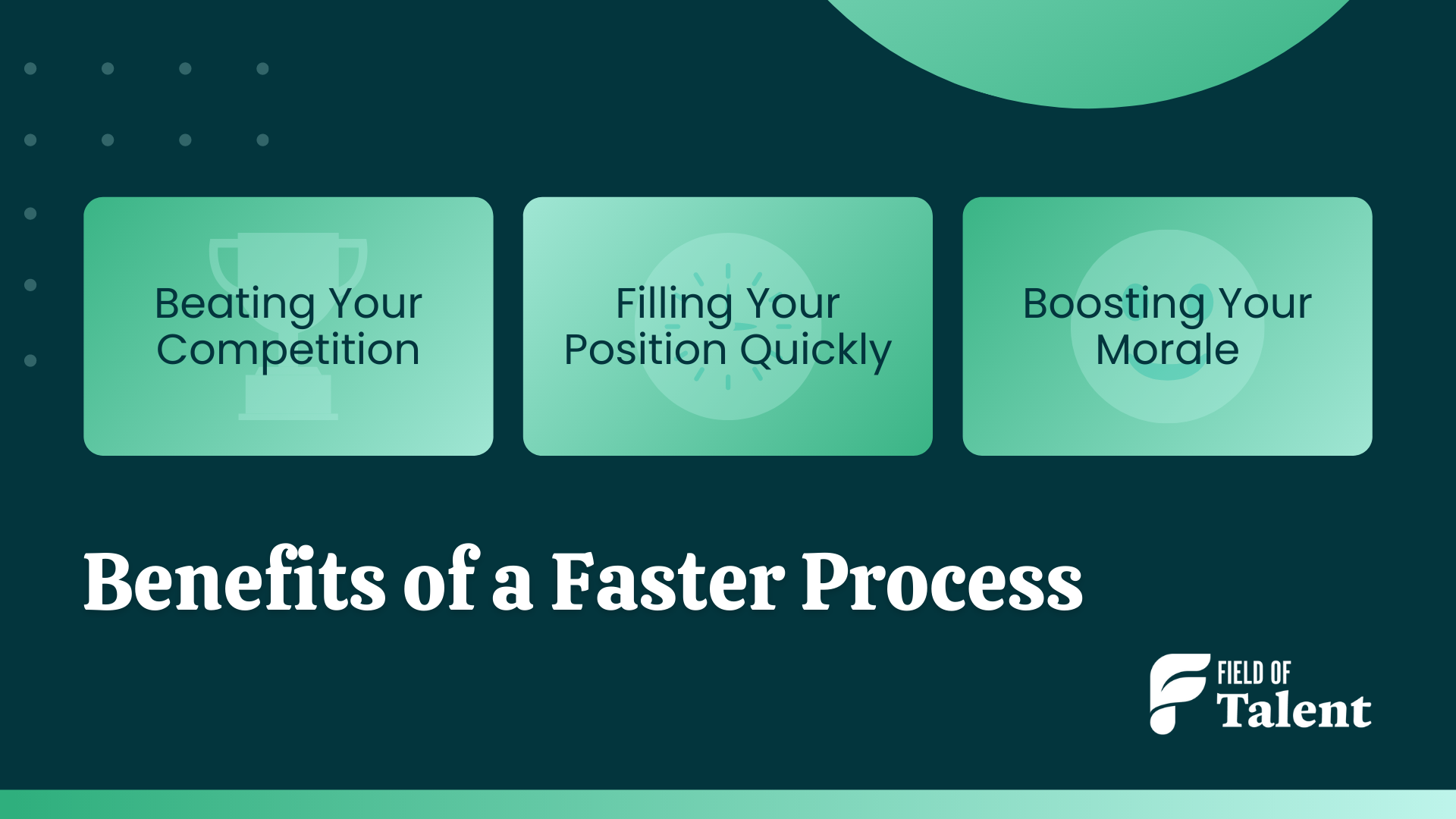Imagine: You and your recruitment team unexpectedly just lost a top-performing Finance team member and you need to find a new employee.
You think you have the luxury of time because she had no deliverables due any time soon. But, because your recruitment system isn’t set up to hire candidates quickly, you deprioritize hiring a replacement.
The two employees remaining on the team have to absorb the work of the third. And despite their experience in the field, they’re unable to work at the speed and efficiency of the person who left.
Team morale decreases with every passing day. Their mental health, well-being and work-life balance are at all-time lows. Finally, they both quit. And your Finance team is devastated within a short amount of time.
Now, you’re really scrambling – desperately searching for a top draft pick in a hurry. If only you had a recruitment process, systems and action plan to quickly hire, train and onboard top talent in the first place.
Sure, this is a hypothetical nightmare situation for any human resources or recruitment professional. But, it could be true for your organization on any given day.
Slow recruitment doesn’t only cost you bad hires, lost productivity and missed revenue. But team morale too. Learn how to improve and expedite your hiring process, so you get the top talent your organization needs not only to survive – but thrive.
Breaking down the cost of a bad hire
Before highlighting how a slow recruiting process can impact your organization and employees, it’s crucial that you know the consequences of bad hires in your company. And what’s the root cause of bad hiring? Often, the culprit is a recruiting process where organizations are forced to take their third, fourth or fifth choices – instead of getting what should have been their first pick.
The US Department of Labor estimates the cost of a bad hire at up to 30% of the individual’s first year salary. If you hired them at a $100,000 annual salary, the approximate cost would be $30,000. Astonishing.
And, depending on the individual’s role and impact in the organization, the cost of a bad hire can range much, much higher. Why? These are all the ways bad hiring impacts your organization:

Recruitment costs
Recruiting itself is expensive. The average cost per hire in 2022 is $4,425 (SHRM). And, if your organization takes longer than the average 36-42 days to hire for open positions, costs continue to rise. Hiring for executives and leaders ranges higher at almost $15,000 (Zippia).
Other recruitment cost examples include headhunters, technology solutions and advertising.
After making a bad hire and realizing the impacts, you’ll have to start recruiting again to replace them. A vicious, unforgiving cycle.
Training & onboarding
It requires about 12 weeks or a full quarter for a new hire to work at full capacity in their new position (Zippia). If your work is particularly nuanced and proprietary, the training and onboarding timeline can range even longer.
When you make a bad hire within your organization, onboarding is more difficult for a number of reasons.
- The individual doesn’t have any experience in your industry or with your set of tools.
- They require a longer learning curve and more supervision from other employees than most other new hires. Using valuable team resources and capacity.
- If you need to hire a replacement for your bad hire, they’ll need training and onboarding as well.
Productivity
The obvious impact of a bad hire is in the actual work. When a bad hire joins the team, productivity can stagnate. Sure, it typically takes 12 weeks for a new hire to gain full productivity. But, it’s typically easy to spot hires who won’t pan out longer than the initial training period.
Not only is that position’s productivity affected but others as well. When you make a bad hire, it requires a team effort to pick up the slack that the individual is causing.
Damaged reputation
Apart from the tangible costs of a bad hire like recruitment expenses and lost productivity, mistakes in the recruitment process can also have intangible consequences. For example, a damaged reputation.
Depending on the position the bad hire had, that damaged reputation can be external or internal. If customer-facing, the external people and organizations with whom the individual interfaced may certainly think differently about your brand. And if they only worked internally, coworkers may doubt the hiring manager and leadership’s recruitment skills and strategy. Leading to a fractured, distrusting culture – or worse, a mass exodus.
We get it! Making bad hiring decisions can be costly.
But, how do we stop making bad hires? How can we stem the problem?
First, diagnose it. What’s causing bad hiring practices in your organization? Then, you can take steps to resolve the issue and move forward. For most organizations a slow recruitment process is their downfall.
Impacts of a slow recruiting process
A long hiring process can have its advantages. For example, making sure you hire correctly and that your final choice is a great culture fit.
But, organizations can suffer tangible and intangible consequences from a slow recruiting process, including but not limited to decreased morale, revenue and quality of hire.
A slow process, however, doesn’t only affect the organization. Candidates are impacted as well.

Morale & culture
An intangible impact of a slow recruitment process that most organizations don’t consider is a hit to morale and culture – both with your candidates and your internal team.
First, a slow recruitment process can be a turn-off for your top draft picks. If you operate slowly in recruitment, they may assume that’s how you operate internally as well – a potential red flag for high-capacity, speedy talent. Additionally, the more time you give them during the recruitment process, the more likely they’ll apply and consider offers elsewhere. 96% of job candidates in 2021 accepted their first offer given (SHRM).
And finally, if they don’t accept your offer this time around, they may never return to your organization again. A bad recruitment experience can cause a candidate to spread the word to friends and coworkers and create a storm of negative word-of-mouth about your team in your community.
Second, your team and organization as a whole may be frustrated with their increased workload while you search for a new hire to take on the work. Sometimes to the detriment of mental health and work-life balance.
Missed revenue
A slow recruitment process will put your organization behind schedule. Meaning you’re missing out on valuable revenue that your new hire could be helping increase.
Apart from missing productivity in sales positions, you may also lose out on renewals and much-needed customer care in service positions. Because it costs more to acquire new customers than keep existing ones, attrition can be devastating.
Lower quality hires
Because all organizations are targeting the highest performers and innovators, they are hired the quickest. When your recruitment process drags on for too long, your top candidates will opt for other organizations or worse, your competitors. Leaving you with lower quality hires – or simply, not the top draft picks you deserve.
Icing on the cake – the longer a candidate waits for a new job, the higher likelihood they ask for a higher salary. Meaning that not only will you get lower quality hires, but you’ll also pay more for lower quality hires.
With all the negative impacts of slow recruitment and hiring processes, what are some ways you can speed up your hiring process?
This is why Field of Talent exists.
Hiring better & faster – more affordably & easily
So, what can a faster recruiting process do for your organization? How does it solve your problems? And even if you don’t think you have any recruitment or hiring issues, how can an expedited hiring process help your candidates and eventual employees?
For starters – when you improve your hiring process, you’ll finally get the top talent your team needs.

Beating your competition
When it comes to recruitment speed, being faster than your competition gives you a huge advantage. SHRM says that the average wait time between job application and first interview is 24 days. If you’re able to beat your competition to the interview stage and extend an offer to your top draft picks, they may accept before ever even entertaining offers elsewhere – depending on how much time they’ve been searching for a new career, the strength of your offer, the culture fit and other factors.
If your candidates are particular about their industry, you have a greater competitive advantage over your rivals. Not only will you hire great, top-tier talent but your closest adversaries will not.
Filling your position quickly
While a fast recruitment process certainly aids your organization in getting top draft picks, it’s crucial that you ensure your candidates feel comfortable moving forward. Just as you and your team think your people need to fit the company’s culture, mission and position’s requirements, the people you’re recruiting need to be confident in the same.
When you hire a candidate quicker than your past process or your competitors, you also decrease the need for internal resources absorbing time and money to fill the empty position. Once you train and onboard your new hire, you’ll be operating full speed ahead just as normal.
With a decreased time-to-hire, you’ll increase productivity and revenue.
Boosting your morale
A slow recruitment process can be damaging to your organization’s morale and culture. While you search for an individual to fill an empty position, your team needs to fill that gap – costing time, money and capacity. Sometimes, to the detriment of their mental health, work-life balance and company morale.
When you speed up your recruitment process, your team rallies around a new hire because they’ve been relieved of their extra, short-term duties. Especially when you hire a rockstar, they find confidence in your company’s leadership and hiring capabilities. Win win!
Field of Talent helps your organization by speeding up your recruitment process with proven systems, processes and tools. To help you get the top talent your team needs to survive and thrive.
Slow recruitment processes negatively impact your candidates, your team and your bottom line. By expediting your process with efficient systems, tools and strategy, you’ll hire better draft picks faster – more affordably and easily.
Get your free consultation with the Field of Talent team with a century of recruiting experience here.


